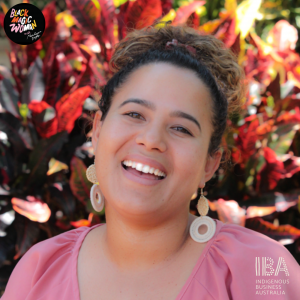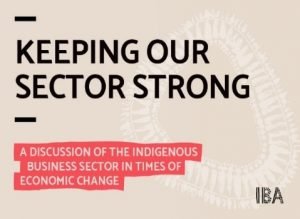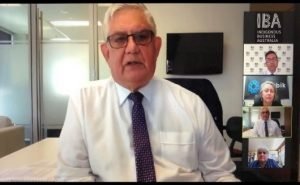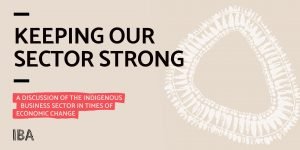INDIGENOUS BUSINESS AUSTRALIA





IBA are excited to announce that we’ve partnered with the Black Magic Woman Podcast to bring you a series of episodes that will be based on a variety of topics including housing, business, youth, women, investing, financial literacy, economic development and COVID-19 recovery.
In the first episode of the partnership series, Black Magic Woman's host Mundanara Bayles sits down to yarn with IBA customer Kantesha Takai.
Kantesha is from the Torres Strait and is the heart and soul behind Lola Digital; a boutique creative and content agency based on Thursday Island in the Torres Strait, that provides tailored marketing strategies and support to government, corporations, NGO's and small business.
Kantesha shares her experiences with IBA from buying her first home, to how IBA supported her through her business journey. We also yarn about her experiences and learnings from the IBA programs Kantesha participated in and how it inspired her to create economic development opportunities in her community. An amazing yarn to kick off the IBA and Black Magic Woman Podcast partnership series!
"I grew up on an island without any electricity or running water. To do my assignments at night, it was either get it done before the genny goes off or do it by using a torch. If I can do it, anybody can!"
- Kantesha Takai, Lola Digital
Listen to the episode here.
Have you ever considered building your own home? With IBA’s recent $150 million Government equity injection, building your own home could be a reality.
For Bunyah man Beau and his wife Jess, building their first home was a dream come true. The couple was attracted to building for the freedom of creating a home that was perfectly suited to them.
“Jess and I decided to build our own home because we really wanted to make the house ours. We wanted to start from scratch and just decide how we wanted to set the foundations for our family in a way so it would be perfect for us,” says Beau.
In the Federal Government’s bid to boost construction and employment opportunities, IBA received a $150 million equity injection. The funds will help Aboriginal and Torres Strait Islander people to get into the housing market sooner, with fast-tracked home loan applications for customers who are wanting to build a home in a regional location and the loans have no application fees and low deposit requirement.
“Building your own, you can tell people ‘I built this, I designed this, we chose this, and this is how we wanted it, and this is our ideas come to life.’ This is our dreams on a slab of concrete. This is what we wanted. So, the house can grow with us when we grow our family.”
If you’ve ever considered building, now may be the perfect time.
To find out more about the application process, contact one of our friendly home loan consultants.
More information on the equity injection.

‘Invigorate – Build – Maintain’: words that resonate with many of us at these times, and thus a particular poignant theme for 2020’s Indigenous Business Month. As we wrapped up the month’s focus, we carry on the theme as generations of Aboriginal and Torres Strait Islander people have for thousands of years.
On 12 October IBA held a virtual business forum with the Minister for Indigenous Australians, the Hon Ken Wyatt AM, and inspiring business owners/leaders, Nicole Stewart and Katrina Fanning, to discuss how they have dealt with the current world.
The 2020 theme resonated with Nicole Stewart of Gerrbik Laundry Services. She noted, ‘Those three words mean EVERYTHING to me.’ As a business owner, she emphasised how she first had to invigorate herself after the huge impact that COVID had on her business. Then she could focus on building back.
Eighty per cent of Gerrbik’s business was with the airlines. Nicole had to diversify her business and manage as an entity based in Melbourne’s extended lockdown. Now she’s looking at new ways to service her customers and expand her base.
‘I had to invigorate me…So that I could maintain what business I did have and going forward what I need to build…It was hard and it’s going to be hard,’ said Nicole. ‘There’s a lot people out there that are scared to come back and process their life like they used to pre-COVID.’
Although the pandemic hit hard around the world, the resilience of Aboriginal and Torres Strait Islander people is unprecedented. Words like ‘unprecedented’, while true, don’t help to invigorate your next steps so the forum’s discussion ventured further into how to manage past the crisis.
The panel was moderated by IBA CEO Rajiv Viswanathan. He noted the discussion comes at a really important time for the Australian economy as a whole but also particularly for the Indigenous business sector.
‘We’ve seen the sector really grow and thrive and we’ve seen business owners across the country demonstrate incredible resilience and ingenuity,’ said Rajiv as the discussion ranged from recognition of the difficulties of 2020 to the positive outlook of the future.
Change is imminent but how we manage that change is key. The panellists gave insight to the diversity of businesses out there and their ability to adapt with the times.
The Minister emphasised that resilience and highlighted a roadmap for the future which must include economic development, employment and education. He noted that we need to look at all the elements to see where the hooks are for Indigenous people to gain the skills to grow opportunities.

‘When Australia opens up again, it’s going to be a different world,’ said the Minister. ‘So, one of the things we need to look at is where are the opportunities that are different than what we intended in the beginning?’
The Minister noted the challenge will be how do we sustain not only the Indigenous businesses that exist now but grow more. He wants to see Indigenous people directly profiting from Indigenous held land – not handing that over for someone else to run and profit. He noted prospects for global relationships as well as emissions trading schemes and carbon footprint opportunities.
‘We’ve got to seize opportunities, support people on country, and provide the knowledge and skills they will require, plus resources in some instances.’
‘Certainly, IBA will play a critical role in the way in which we partner collectively to build capability among our people,’ said the Minister.
Nicole was upfront about running her own business. She noted that when you have a business, you might not have a huge amount of money in the bank. When she found out about IBA’s Business Relief Package, it changed her mind set for her business going forward.
‘My connection with IBA has been a lifeline to me!’ said Nicole. ‘They believed in me which has given me a lot more belief in myself.’
Nicole received a loan/grant package as part of the relief package announced in April 2020. The package was a collaboration with NIAA to provide Indigenous businesses that were impacted by the pandemic (whether an IBA customer or not) with support.
‘That’s where then I could invigorate ME once I was accepted for the loan,’ said Nicole.
Katrina Fanning is the Founder and Director of Coolamon Advisors, an Indigenous partner delivering the Business Relief Package with IBA.
Having met with multiple businesses through the process, Katrina was impressed by how hard they are working and how responsive they’ve been to the support. She said, ‘The diversity of the businesses that we have around the country really surprised me…They are just getting on with whatever it takes to get things moving.’
Katrina is a business owner herself so learned firsthand about the hits of the pandemic. Overnight she lost 3 months of bookings. She talked about how she had to reach out and leverage on her partnerships, as well as have the patience to rethink her service offering.
‘I had to change really quickly and be prepared to look at areas we hadn’t traditional worked in,’ said Katrina. She added, ‘Stay focussed on what’s your core business. Not to spread yourself really thin across a number of ideas as you won’t be able to put all your timing into it.’
Coolamon Advisors were among the many businesses that transitioned to online versus face to face to deliver business assessments with customers for IBA over video or phone.
Our Indigenous youth and women are two groups heavily hit by COVID – both the Minister and Katrina commented about these sectors and harnessing the strength they hold.
The Minister talked about cadetships and internships to leverage the skills of our youth and get them employed and into pathways for real jobs. He also noted the importance of education in the process. Katrina has seen small businesses, particularly family businesses, hit by the pandemic bring young people into the company and find a new invigoration in innovating the way to work.
Futures Forum is an initiative of IBA that is helping to rewrite the future of business that includes culture. Rajiv talked about the initiative and importance young people have as our future leaders.
Katrina and Nicole are part of IBA’s Strong Women Strong Business network and emphasised how Aboriginal and Torres Strait Islander female business owners are not alone in this.
‘We have got incredible resilience where we’re perfect for growing businesses,’ said Nicole. ‘We just got to believe in ourselves.’
She acknowledges it’s not going to be easy, but the rewards outweigh the work.
‘To lay in bed in the night-time and know that you’ve given it your all to get to where you are. Fight the struggles that you might find along the way,’ said Nicole. ‘Chase your dream. Because we can make it happen. IBA will help you, we’ll all help you.’
Minister Wyatt – ‘I eventually want to see that when we give a contract for a grade separation on a major road that it’s a 100% Aboriginal owned business that wins that contract…On the pathway to having an Indigenous company in the top ASX listing which means that you stand with the top 100-200 companies in this country…We have to dream that way.’
Nicole Stewart (Gerrbik Laundry Services) – ‘Our sector is going to be huge! We’ve faced diversity for many years and won…. But I honestly feel that our sector will go through the roof.’
Katrina Fanning (Coolamon Advisors) – ‘The one I’m most hopeful for is to see a growth in the size and length of the contracts that our businesses start to see, whether it be from government or corporate…I’m looking for those tipping points to open the gates even more.’
Rajiv Viswanathan (IBA) – ‘It’s been a really challenging year but it’s also a year and a time to reimagine what’s possible. And I think you’ve seen from our panel that there’s a lot of passion and inspiration out there that we can really capture as we come out of this phase and come into the recovery process. All of us together want to see this sector continue to thrive.’
View full video recording below:

Indigenous Business Australia (IBA) will receive $150 million in funding from the Federal Government over 2 years to stimulate construction and employment opportunities in regional locations. This equity injection will provide funding to support more Aboriginal and Torres Strait Islander people obtain a home loan to build their own home.
The additional funding will be committed over the next 2 years as part of IBA’s Indigenous Home Ownership Program and will enable people to access home ownership sooner.
IBA’s home ownership program is one of the longest standing programs successfully supporting economic self-management and self-sufficiency for Aboriginal and Torres Strait Islander people.
Over the life of the program, close to 20,000 Aboriginal and Torres Strait Islander people have been able to achieve their goal of owning a home, often becoming the first person in their family history to do so. In the past five years alone, IBA has provided more than $1 billion in home loans to a record number of applicants.
IBA CEO, Rajiv Viswanathan, noted that the organisation is constantly looking for ways to innovate, and expand funding wherever possible.
‘Demand for IBA’s home loan offering continues to grow at unprecedented rates, and we are committed to investigating as many ways as possible to grow available funds to assist more people to get into home ownership, building on the tremendous success of the Indigenous Home Ownership Program.
‘Home ownership is a key pillar on the journey to economic independence, providing not only stable housing, but also an anchor from which to build an asset base for current and future generations, and equity for other investment and business opportunities.
‘The ability for Aboriginal and Torres Strait Islander individuals and families to construct their own home will not only fulfil their dreams of home ownership but stimulate the economy at a time when we need it most.’
Jemma and Alan moved into their newly built home in January 2020. They know firsthand what it has meant to be build their dream as a homeowner. Alan, a Whadjuk Noongar man, said it was the worth the wait to get into a home that was new and all their own.
‘We wanted this for so long. It’s just so good. We can relax now,’ said Alan. ‘What we’re paying in mortgage now is what we were paying for rent so instead of paying someone else’s mortgage, we’re paying our own.
‘Budgeting is a major thing and doing your research. Find out the information before you say you can’t do it. Go talk to IBA and find out.
‘We enjoyed coming each weekend through the build and seeing each stage.’
Alan and Jemma used COVID isolation as a time to fix up their garden and things around the house. ‘This is ours. It’s perfect – it’s exactly how we wanted it.’
Minister for Indigenous Australians Ken Wyatt AM MP met with the homeowners at their new place to discuss what constructing their own home meant to them.
‘We discussed the benefits of owning your own home, including long-term wealth creation, financial security and independence,’ said the Minister.
The equity injection forms part of Australia’s overall economic stimulus package to get all Australians back on their feet and ensure Aboriginal and Torres Strait Islander people are an integral part of that recovery.
IBA Chairperson and Dagoman man Eddie Fry emphasised the importance of this opportunity for both the Australian economy and the Indigenous community.
‘We know that secure and stable housing plays a huge role in being able to build a happy and prosperous life, but it is much more than that – there are also substantial economic benefits to all of Australia.’
Interviews and pictures available upon request.
Media contact: Tara Toohill: 0427 011 938 or tara.toohill@iba.gov.au
 October is Indigenous Business Month and IBA will host a virtual forum to discuss how businesses are coping during these times.
October is Indigenous Business Month and IBA will host a virtual forum to discuss how businesses are coping during these times.
Our CEO Rajiv Viswanathan will moderate a panel discussion with:
Join us for the forum, ‘Keeping Our Sector Strong – A discussion of the Indigenous business sector in times of economic change’ on Monday 12 Oct from noon to 1pm AEDT.
Places are limited so please register to attend. Once registered, a link to access the forum will be sent ahead of the session.

IBA’s Performance Bond Trust has assisted contractors across the country to participate in a wide variety of contracts including mining, civil works, construction, facility upgrades and renewable energy construction by guaranteeing their capacity to complete projects while requiring minimal security.
One of those contractors was Hicks Civil & Mining Pty Ltd - a 100% owned Aboriginal business providing civil construction services and equipment hire throughout the Pilbara region in WA. Through the IBA Performance Bond Trust, they were able to successfully tender to the Koodaideri iron ore mine and have delivered earthwork and drainage works for the project to date.
Hicks Civil and Mining Director, Caitlin Hicks Forshaw says, “We are now focusing on finishing off this project strong and leaving a reputation that will be put down in the history books for Aboriginal Contractors and be the example of showing that Aboriginal Contractors have the capacity to deliver such projects.”
“While we have both our onsite and offsite management teams – it’s the people and organisations that surround us that have also assisted in this project. IBA have been a massive contribution to our business and I have to thank them immensely.”
Through their hard work and success, Hicks Civil & Mining have been able to give back to their community supporting initiatives such as funding school pick-ups and sponsoring local events.
Since inception in 2018 the IBA Performance Bond Trust has now supported over 170 bonds worth $12 million, supporting contracts valued at nearly $202 million. Bonds totaling $167,600 have been returned due to successful completion of projects, many of which have been in regional and remote locations.
Find out more about our Performance Bonds.
Edit: Applications for the Business Relief Package closed on 30 June 2022.
Indigenous businesses are significant employers of Aboriginal and Torres Strait Islander people and generate broader social and economic benefits for their communities. The economic impact of COVID-19 is seeing many of these businesses face significant challenges.
Indigenous Business Australia (IBA) and the National Indigenous Australians Agency (NIAA) have developed a new support package for Indigenous businesses who have been impacted by the crisis, including non-IBA customers. The package includes:
Up to $50 million in assistance is being provided through these initiatives.
These measures follow earlier relief announced by IBA for its customers. This includes a waiver of interest and deferral of loan repayments for business loan and equipment leasing customers impacted by the current COVID-19 crisis for an initial 4-month period, a reduction in our interest rates for all IBA home loan customers for an initial period of 6 months, as well as deferral of repayments for home loan customers in hardship.
IBA CEO Rajiv Viswanathan said, “We know that many Indigenous businesses will be facing uncertainty and economic hardship now and in the coming months. In this rapidly changing environment, access to a support package like this will help Indigenous businesses to navigate the crisis, and to build resilience for the future.”
Minister for Indigenous Australians, the Hon Ken Wyatt AM MP, noted, “IBA is working closely with the National Indigenous Australians Agency, other Government agencies and sector participants to ensure we have a coordinated approach to assisting Indigenous Australians, families, communities and businesses.
“Indigenous businesses are significant employers of Indigenous Australians across Australia, including in regional and remote areas. By supporting them to get through these tough times, we can help them to keep generating positive economic and social benefits for their communities.”
For more information on support available by IBA during the COVID-19 crisis, please visit iba.gov.au/indigenous-business-australia-covid19-support/
Media contact: Tara Toohill 0427 011 938 or tara.toohill@iba.gov.au

In partnership with The Guardian Labs, IBA developed a series of articles on the impacts of home ownership on Aboriginal and Torres Strait Islander people. The last of the series featured two strong Indigenous women and how their families have blossomed through their experiences.
Kylie and Naomi share their stories from budgeting to education to how their kids now see home ownership as an achievable dream.
Read more at The Guardian Labs - IBA: Building Communities.
The second in a series of content developed with The Guardian Labs, the latest article shows the ripple effect of how supporting Indigenous home ownership drives a strong economic future for Australia.
IBA Chairperson Eddie Fry and Deloitte Access Economics’ Urban Advisory practice leader Nicki Hutley discuss the multidimensional impacts of home ownership for Indigenous Australians and all Australia.
From reduced pressure on the wider economy to economic injections that would not happen otherwise to improved wellbeing - Indigenous home ownership is a valuable part of our society.
Read more at The Guardian Labs - IBA: Building Communities.

Indigenous Business Australia (IBA) has announced details for the highly anticipated 2020 Strong Women Strong Business conference.
Following on from the immensely successful 2018 conference held in Adelaide, IBA is expanding this year’s conference to include an additional 150 women, taking the total conference attendance up to 350 which will make it the largest gathering of Aboriginal and Torres Strait Islander businesswomen in Australia’s history.
A Yamatji and Nyoongar woman and an IBA Board Director, Shirley McPherson, said that the Strong Women Strong Business network had gone from strength to strength since the first conference, showcasing the determination, ingenuity and innovation of the Indigenous business sector.
“The success of Strong Women Strong Business is due to the strength of the collective network. We have always been committed to partnering with as many Aboriginal and Torres Strait Islander businesswomen as possible to ensure that as the network grows it will always remain deeply rooted to its original intent – a place for Indigenous business women to share, grow and support one another’s businesses.”
“We are very proud of our partnerships with strong women business leaders that help guide the Strong Women Strong Business network and are critical in making the 2020 conference a reality,” said Ms McPherson.
The key pillars of the three-day conference will be capability and capacity building with a focus on innovation, technology, business financial literacy, trade and markets.
Arrernte woman and IBA’s Business Solutions Director, Stella de Cos, said the themes of this year’s conference had been led by the Strong Women Strong Business network and partners.
“Everything we do with Strong Women Strong Business is led by the network and our partners. We read every post and listen intently to the themes our women are discussing and have made sure that the conference program reflects these discussions.”
Applications for the 2020 conference open on 30 January, with limited spaces available. With nearly 1,800 women in the Strong Women Strong Business network alone, IBA is expecting a large volume of applications.
“We received more than 500 applications in just one week to attend the 2018 conference and we are expecting even more women to apply this time around,” said Ms de Cos.
“The Indigenous business sector is one of the fastest growing business sectors in Australia, and our women are a huge part of that growth. Over the past two years we have seen a 93 per cent increase in the number of business loans we are approving for Indigenous women and it is not slowing down. We want to ensure we’re doing everything we can to support this incredible business boom.”
The Strong Women Strong Business 2020 conference is funded by IBA, with successful applicants receiving travel and accommodation to Darwin.
Applications for Strong Women Strong Business open 30 January and close 14 February 2020. More information can be found at strongwomenstrongbusiness.com.au or apply now.
Media contact: Tara Toohill, 02 9207 6362 or tara.toohill@iba.gov.au